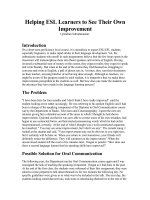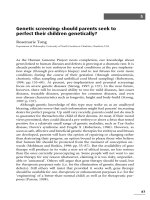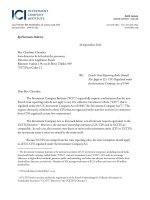Genetic screening - should parents seek to perfect their children genetically
Bạn đang xem bản rút gọn của tài liệu. Xem và tải ngay bản đầy đủ của tài liệu tại đây (161.68 KB, 14 trang )
5
Genetic screening: should parents seek to
perfect their children genetically?
Rosemarie Tong
Department of Philosophy. University of North Carolina at Charlotte, Charlotte, USA
As the Human Genome Project nears completion, our knowledge about
genes linked to human diseases and defects is growing at a dramatic rate. It is
already possible to test embryos for several conditions at the pre-implanta-
tion stage (through pre-embryo biopsy) and to test fetuses for even more
conditions during the course of their gestation (through amniocentesis,
chorionic villus sampling and umbilical cord blood sampling) (Robertson,
1994: pp. 155–60). At present, pre-implantation and prenatal screenings
focus on severe genetic diseases (Strong, 1997: p. 137). In the near future,
however, there will be increased ability to test for mild diseases, late-onset
diseases, treatable diseases, propensities for common diseases, and even
non-disease characteristics such as longevity, height and body-build (Strong,
1997: p. 137).
Although genetic knowledge of this type may strike us as an unalloyed
blessing, ethicists worry that such information might fuel parents’ increasing
desire for perfect progeny. Up until very recently, parents could not do much
to guarantee for themselves the child of their dreams. At most, if their moral
views permitted, they could discard a pre-embryo or abort a fetus that tested
positive for a relatively small range of genetic maladies, such as Tay–Sachs
disease, Down’s syndrome and Fragile X (Robertson, 1996). However, as
soon as safe, eVective and beneWcial genetic therapies for embryos and fetuses
are developed, parents will have the option of repairing or changing rather
than destroying their progeny, an option bound to please those who believe
that human life should be protected from the moment of conception on-
wards (Mehlman and Botkin, 1998: pp. 55–87). But the availability of gene
therapy will produce in its wake a new set of ethical issues, no less serious
than the ones currently preoccupying us. Some people will not want to use
gene therapy for any reason whatsoever, claiming it is too risky, unpredict-
able or ‘unnatural’. Others will argue that gene therapy should be used, but
for therapeutic purposes only (i.e. for the elimination of genetic diseases and
defects). Still others will insist that provided it works well, gene therapy
should be available for non-therapeutic or enhancement purposes (i.e. for the
‘engineering’ of a better-than-normal child) as well as for therapeutic pur-
poses (Parens, 1998).
87
Since it is the position of this last group of people that most concerns us,
the question I wish to pose is this. Assuming the successful development of a
wide range of safe and eYcacious genetic therapies, should parents be
encouraged to perfect their children through genetic means – as well as
traditional environmental means such as education? To this query many
people will, I suppose, answer with an immediate ‘yes’. They will reason that
parents should do everything in their power to enhance their children.
SpeciWcally, parents should begin by striving to create the best possible
uterine environment for their progeny. In particular, pregnant women
should refrain from drinking alcohol, smoking tobacco and ingesting a wide
range of illicit and licit drugs during pregnancy (Matthieu, 1996: pp. 9–11).
As prenatal gene therapies develop, pregnant women should also permit
physicians to penetrate their bodies, more or less invasively, in order to treat
their fetuses’ genetic maladies or simply to improve upon their genetic
endowments. Finally, parents should provide their children with as many
safe, eVective and beneWcial postnatal genetic and environmental enhance-
ment therapies as they can reasonably aVord. After all, isn’t it only right for
parents to provide their children with such opportunities?
Conceding that the above line of reasoning sounds level-headed and
enlightened, I none the less fear its darker side. Do parents really have a right
and duty to ‘perfect’ their children genetically, including their already normal
children? For that matter, do parents really have a right and duty to ‘perfect’
their children environmentally? In this chapter, I will argue that although
parents have a limited right to enhance their already normal children geneti-
cally, and, conceivably, also a limited duty to do so, they should not be
encouraged to do so. Indeed, society should actively discourage parents’
quests to ‘make’ perfect babies (Kass, 1985). It should do so, however, not
through legal bans or prohibitions on the development of genetic therapies,
but through: (1) the development of practice guidelines for health care
researchers and practitioners specializing in genetic screening, testing, diag-
nosis, counselling and therapy; and, even more importantly, (2) the creation
of democratic fora designed to achieve some sort of public consensus about
the extent of parents’ procreative and rearing rights.
Do parents have a right to enhance their children
genetically?
The US lawyer John A. Robertson has analysed in great detail parents’ rights
to select their oVspring’s characteristics (Robertson, 1994: p. 152). As Rober-
tson sees it, the speciWc right to select oVspring characteristics is linked to two
more general rights: (1) a parent’s right not to procreate children because of
the more or less burdensome aspects (physical, psychological and social) of
88 R. Tong
reproduction; and (2) a parent’s right to procreate a child with particular
characteristics (e.g., a child who will resemble his or her parents, or a ‘normal’
child). This second right derives from ‘the great importance to individuals of
having biologic oVspring – personal meaning in one’s life, connection with
future generations, and the pleasures of child rearing’ (Robertson, 1994:
p. 153). Since negative selection activities (carrier screening, pre-implanta-
tion screening, prenatal screening and abortion) and positive selection activ-
ities (therapeutic ex utero or in utero genetic manipulation) enable parents to
select oVspring traits, Robert-son views these activities as protected by a
person’s procreative liberty.
Robertson notes, however, that like all rights, procreative rights are
limited. They protect ‘only actions designed to enable a couple to have
normal, healthy oVspring whom they intend to rear’ (Robertson, 1994:
p. 166). Actions that aim to produce oVspring who are supernormal (enhan-
cement), subnormal (intentional diminution) or clones, says Robertson,
‘deviate too far from the experiences that make reproduction a valued
experience’ to be protected by procreation liberty rights. However, some of
these non-therapeutic actions – those aimed at enhancement – might be
viewed as part of ‘parental discretion in rearing oVspring’ (Robertson, 1994:
p. 167). Parents presently seek to improve their children in a variety of ways.
For example, many parents send their children to the best schools, give them
music, art and drama lessons, have their teeth straightened, and so on. Some
parents go much farther than this, however. In the name of ‘bettering’ their
children, parents submit their children to sex-alignment operations, certain
cosmetic surgeries, growth-hormone treatments, Ritalin therapy and
multiple doses of Prozac. So long as parents can show that such interventions
are safe, eVective and beneWcial, state authorities will not interfere with
parents’ child-rearing activities. Given that this is the case, Robertson reasons
that state authorities are not likely to interfere with genetic enhancement
interventions, although they would be likely to interfere with genetic dimin-
ution interventions.
Implicit in Robertson’s view is the idea that, ordinarily, enhancement of a
fetus is beneWcial, but that diminution of a fetus is harmful. Robertson’s ideas
about what constitutes a harm seem to be roughly equivalent to those of
Norman Daniels, who views as harmful any actions that detract from so-
called species-typical functioning (Daniels, 1986: p. 28). If it is typical for the
human species that its members be able to hear and see, for example,
deliberately deafening or blinding a fetus is harmful to the fetus. But the
question remains whether, according to Daniels’s view, actions that add to
species-typical functioning are also harmful. My reading of Daniels’s argu-
ments suggests that, on the contrary, he would view such actions as beneWcial.
So long as every member of the species can do what is typical for the species
reasonably well, it matters not that some members of the species can do it
89Genetic screening
exceptionally well. In fact, it might be a good thing if every member of the
species could be a ‘peak performer’.
Given the reasonability of Robertson’s and Daniels’s implied positions on
enhancement, it is diYcult to identify what might, in the end, be harmful
about enhancing one’s progeny. Interestingly, in the course of explaining why
it would be wrong for deaf parents, who view deafness as a valuable culture
rather than a disability, to use genetic therapy prenatally to ensure deaf
children for themselves, the lawyer Dena Davis (1997) provides some clues.
Davis concedes that since people have diVerent ideas about what counts as an
enhancement and what counts as a diminution, deaf parents, wishing to
ensure deaf children for themselves, might reasonably argue that the lifestyle
in the deaf community is a good one for children – indeed, according to
Lennard Davis (1995), a better one than the lifestyle for children in the
non-deaf community. In essence, deaf parents might argue in the manner
Amish parents argue when they defend their practice of limiting their
children to an elementary school education on the grounds that further
formal education interferes with the Amish system of home-based vocational
training – i.e. learning from your parents how to live a simple, ‘God-fearing,
agrarian life’ (Wisconsin v. Yoder, 1972).
Although the majority of US society believes that it is the prerogative of
parents to shape the values and lives of their children, comments Dena Davis,
they still think that it is wrong for Amish parents, for example, to conWne
their children to the Amish community before these children are mature
enough to decide for themselves whether such a small world is the best world
for themselves. Davis notes that by depriving their children of the opportun-
ity to secure a high-school diploma, Amish parents virtually ensure ‘that their
children will remain housewives and agricultural laborers’ (Davis, D., 1997:
p. 565). An Amish child who rebels against the Amish way of life for one
reason or another will Wnd himself or herself without the basic education he
or she needs to be anything other than an agricultural labourer or housewife.
In Davis’s estimation, the parents of this child will have harmed him or her by
substantially limiting their child’s presumed right to control the course of his
or her own destiny. Davis then reasons that if Amish parents harm their
children by denying them educational opportunities, the lack of which will
set them back considerably in the larger, non-Amish community should they
decide to enter it, deaf parents would even more egregiously harm their
children by using genetic diminution therapies to deprive them permanently
of their ability to hear. Davis (1997: pp. 569–70) comments:
[D]eliberately creating a child who will be forced irreversibly into the parents’ notion
of ‘the good life’ violates the Kantian principle of treating each person as an end in
herself and never as a means only. All parenthood exists as a balance between
fulWlment of parental hopes and values and the individual Xowering of the actual child
90
R. Tong
in his or her own direction . . . Parental practices which close exits virtually forever are
insuYciently attentive to the child as an end in herself. By closing oV the child’s right
to an open future, they deprive the child as an entity who exists to fulWll parental
hopes and dreams, not his own.
Although Davis’s arguments are directed against the practice of genetic
diminution, the crucial question to ask for our purposes is whether geneti-
cally enhancing a child ‘closes’ or ‘opens’ doors for him or her. On the one
hand, it seems that an enhanced child might have a more open future than a
‘normal’ child. For example, a person with exceptional intellectual capabili-
ties has the opportunity to pursue a much wider range of career options than
a person with minimal intellectual capabilities. On the other hand, an
enhanced child might have a future more closed than a ‘normal’ child if, for
example, his parents enhanced his intellectual and rational capacities to such
a degree that his physical and emotional capacities shrivelled. There is
historical precedent for such a concern. Using simply environmental means
(education), John Stuart Mill’s father, for example, overdeveloped his son’s
rational and philosophical talents, and underdeveloped his son’s emotional
and poetic talents. As a result, John Stuart Mill suVered a mental breakdown
as a young adult (Mill, 1956). Clearly, as in the case of parents who argue that
they have a right to discipline, educate and medically treat their children as
they see Wt, parents who argue that they have a right to alter their children
genetically as they see Wt are subject to state interference if their actions prove
harmful to their oVspring. Parents do not have a right to harm their children,
whether this harm consists in physical or psychological abuse, or in using
genetic therapy to determine their children’s future.
Do parents have a duty to enhance their children genetically?
The fact that parents have a limited right to enhance their children genetically
does not mean they have a duty to do so, unless the term ‘enhancement’ is
interpreted to include not only instances of making normal children better
than normal, but also instances of making less-than-normal children normal
(Juengst, 1998). SpeciWcally, if the necessary gene therapies were available,
parents might have a limited duty to provide their oVspring with what LeRoy
Walters and Julie Gage Palmer term ‘health-related’ physical, intellectual and
moral genetic enhancements, but not also with ‘non-health-related’ ones
(Walters and Palmer, 1997: pp. 109–11). Among those health-related enhan-
cements listed by Walters and Palmer are eliminating the genes associated
with deleterious physical, intellectual and psychiatric conditions. Since
health-related enhancements are calculated to bring abnormal individuals up
to species-typical functioning only, they are, according to Walters and
Palmer, to be distinguished from non-health-related genetic enhancements
91Genetic screening









